Latest News
19 % decrease in poppy cultivation: MoCN
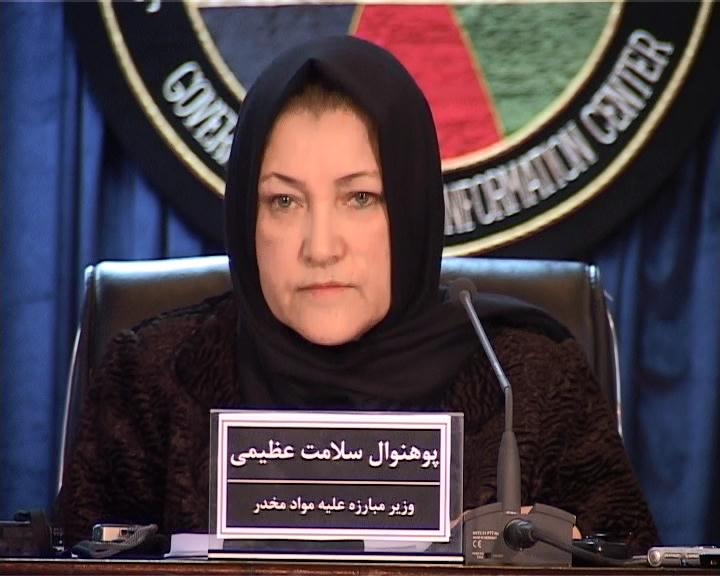
The Ministry of Counter Narcotics (MoCN) says that opium poppy cultivation in Afghanistan decreased 19 per cent in 2015, compared to the previous year.
The minister of counter narcotics in a press conference noted that in the year 2015 we witness a decrease in poppy cultivation and many achievements in seizing drugs.
“Of the 224,000 hectares of lands 183000 of them cultivated poppy, which shows a 19 percent decrease,” said Salamat Azimi, minister of counter narcotics.
Azimi emphasized that Afghan Opium Cultivation decreases for the first time in six years.
Lower levels of cultivation translates to a 48 percent reduction in the potential production of opium in 2015 – 3,300 tons compared to 6,400 tons in 2014.
According to a U.N. and Afghan government joint survey, unfavorable weather conditions were a major reason for the decline. They also pointed out there was a change in the methodology used to estimate areas of poppy cultivation, and while there was certainly a decrease, the percentage may not be exact.
In the meantime, deputy of counter narcotics interior ministry said about the lack of enough forces to stop selling drugs.
“We do not have the capacity to prevent selling drugs in the capital. I have to say that we have seized around 2500 kilograms of drugs from Sayed Abad and Ahmad Abad districts of Paktia province,” said Baz Muhammad Ahmadi, deputy of interior ministry counter narcotics.
However, the United Nations announced the increase of poppy cultivation in the north and capital.
“Balkh, Faryab, Badghis, Sar-e Pul, Uruzgan, Ghor, Kunduz and Kabul are those provinces which poppy cultivations show increase in them,” said Regional representative of the UN Office on Drug Control.
Billions of dollars have been spent on counter-narcotics efforts in Afghanistan in the past decade, including programs encouraging farmers to switch to other cash crops like wheat, fruit and saffron.

Latest News
Trump administration to suspend immigrant visa processing for 75 nations

U.S. President Donald Trump’s administration is suspending processing for immigrant visas for applicants from 75 countries, a State Department spokesperson said on Wednesday, as part of Washington’s intensifying immigration crackdown.
The pause, which will impact applicants from Latin American countries including Brazil, Colombia, and Uruguay, Balkan countries such as Bosnia and Albania, South Asian countries Pakistan and Bangladesh, and those from many nations in Africa, the Middle East, and the Caribbean, will begin on January 21, the spokesperson said, Reuters reported.
A State Department cable outlining the move and seen by Reuters said the Department was undergoing a “full review” of all policies, regulations and guidance to ensure “the highest level of screening and vetting” for all U.S. visa applicants.
The cable, sent to U.S. missions, said there were indications that nationals from these countries had sought public benefits in the United States.
“Applicants from these countries are at a high risk for becoming a public charge and recourse to local, state and federal government resources in the United States,” the cable outlining the move which was reviewed by Reuters said.
The move, which was first reported by Fox News, does not impact U.S. visitor visas, which have been in the spotlight given the United States is hosting the 2026 World Cup and 2028 Olympics.
The decision follows a November directive to U.S. diplomats asking them to ensure that visa applicants are financially self-sufficient and do not risk becoming dependent on government subsidies during their stay in the U.S., according to a State Department cable seen by Reuters at the time.
“The State Department will use its long-standing authority to deem ineligible potential immigrants who would become a public charge on the United States and exploit the generosity of the American people,” said Tommy Pigott, Principal Deputy Spokesperson at the State Department.
“Immigrant visa processing from these 75 countries will be paused while the State Department reassesses immigration processing procedures to prevent the entry of foreign nationals who would take welfare and public benefits,” he added.
The cable directed U.S. consular officers to refuse any applicants whose visas have been “print-authorized” but have not been printed, or those that have been printed but have not left the consular section.
LEGAL IMMIGRATION
Trump has pursued a sweeping immigration crackdown since returning to office in January. His administration has aggressively prioritized immigration enforcement, sending federal agents to major U.S. cities and sparking violent confrontations with both migrants and U.S. citizens.
While he campaigned on stopping illegal immigration into the United States, his administration has also made legal immigration more difficult – for example, by imposing new and expensive fees, opens new tab on the applicants of H-1B visas for highly skilled workers.
“This administration has proven itself to have the most anti-legal immigration agenda in American history,” David Bier, Cato’s Director of Immigration Studies and The Selz Foundation Chair in Immigration Policy, said in a statement.
“This action will ban nearly half of all legal immigrants to the United States, turning away about 315,000 legal immigrants over the next year alone,” Bier said.
The State Department has revoked more than 100,000 visas since Trump took office, it said on Monday. The administration has also adopted a stricter policy on granting visas, with tightened social media vetting and expanded screening.
Trump, a Republican, captured the White House saying a tougher stance on immigration was needed after years of high levels of illegal immigration under his Democratic predecessor, Joe Biden.
In November, Trump had vowed to “permanently pause” migration from all “Third World Countries” following a shooting near the White House by an Afghan national that killed a National Guard member.
FULL LIST OF COUNTRIES
The list of countries that will be impacted by the suspension, according to a U.S. official, are: Afghanistan, Albania, Algeria, Antigua and Barbuda, Armenia, Azerbaijan, Bahamas, Bangladesh, Barbados, Belarus, Belize, Bhutan, Bosnia, Brazil, Cambodia, Cameroon, Cape Verde, Colombia, Democratic Republic of the Congo, Cuba, Dominica, Egypt, Eritrea, Ethiopia, Fiji, The Gambia, Georgia, Ghana, Grenada, Guatemala, Guinea, Haiti, Iran, Iraq, Ivory Coast, Jamaica, Jordan, Kazakhstan, Kosovo, Kuwait, Kyrgyzstan, Laos, Lebanon, Liberia, Libya, North Macedonia, Moldova, Mongolia, Montenegro, Morocco, Myanmar, Nepal, Nicaragua, Nigeria, Pakistan, Republic of the Congo, Russia, Rwanda, Saint Kitts and Nevis, Saint Lucia, Saint Vincent and the Grenadines, Senegal, Sierra Leone, Somalia, South Sudan, Sudan, Syria, Tanzania, Thailand, Togo, Tunisia, Uganda, Uruguay, Uzbekistan and Yemen.
Latest News
Afghanistan and Indonesia call for expanding bilateral cooperation

Saadullah Baloch, Acting Ambassador of the Islamic Emirate of Afghanistan in Jakarta, and Riki Ihsan, Director for East Asia and Central Asia at Indonesia’s Ministry of Foreign Affairs, met and discussed the expansion of bilateral cooperation in the political, economic, and diplomatic spheres, while emphasizing the friendly relations and mutual respect between the two countries.
According to a statement from the Embassy of the Islamic Emirate in Jakarta, the two sides also discussed holding meetings and official visits by senior officials of both countries in order to strengthen coordination and consolidate relations.
Baloch and Ihsan further discussed encouraging investment in Afghanistan, emphasizing the importance of creating a suitable environment and providing facilities in this area, as well as enhancing economic cooperation.
They also stressed the strengthening and further expansion of friendly relations and constructive cooperation between Afghanistan and Indonesia, and expressed their readiness to continue contacts and cooperation.
Latest News
Chinese envoy, Afghan official discuss ways to strengthen tourism cooperation

China’s Ambassador to Kabul, Zhao Xing, met with Qudratullah Jamal, Deputy Minister for Tourism, Finance, and Administration at Afghanistan’s Ministry of Information and Culture, to discuss ways to strengthen tourism cooperation and expand cultural ties between the two countries.
During the meeting, Jamal urged China to share expertise and cooperate in key areas, including tourism development, capacity building and training for students at the Tourism and Hotel Management Institute, visa facilitation, tourism marketing, and investment in tourism infrastructure.
He also highlighted the historical importance of the Silk Road and called for joint efforts to organize exhibitions in both countries and promote the exchange of specialists.
Ambassador Zhao described Afghanistan–China relations as positive and reaffirmed Beijing’s commitment to preserving and expanding bilateral ties. He expressed readiness to cooperate and share experiences in the discussed areas, stressing that stronger cultural and tourism relations require sustained bilateral cooperation.
-
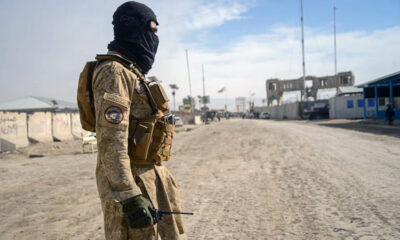
 Latest News5 days ago
Latest News5 days agoICG report says Pakistan most impacted by IEA’s return in Afghanistan
-
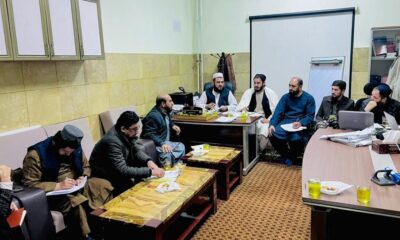
 Latest News5 days ago
Latest News5 days agoHealth Ministry holds meeting on halting medicine imports from Pakistan
-
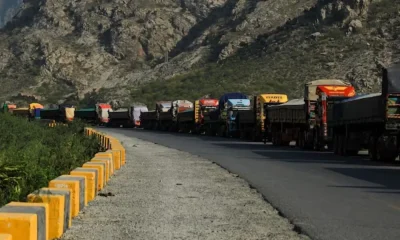
 Latest News2 days ago
Latest News2 days agoPakistan approves re-export of stranded Afghan transit trade cargo
-
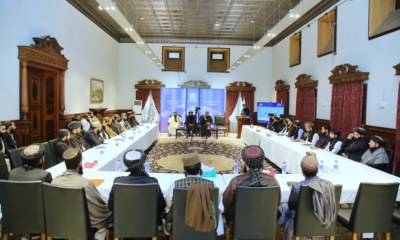
 Latest News4 days ago
Latest News4 days agoAfghan Foreign Ministry holds diplomacy training program with Qatar’s cooperation
-

 International Sports4 days ago
International Sports4 days agoATN secures broadcast rights to Carabao Cup semis across Afghanistan
-
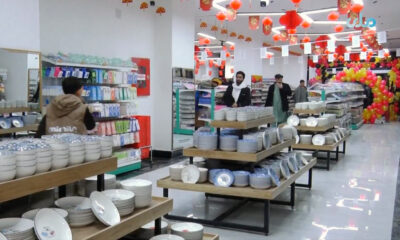
 Business3 days ago
Business3 days agoAfghanistan–China joint market opens in Kabul
-
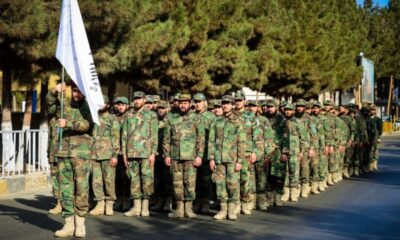
 Latest News4 days ago
Latest News4 days agoAfghanistan’s Ministry of Defense to recruit more forces
-
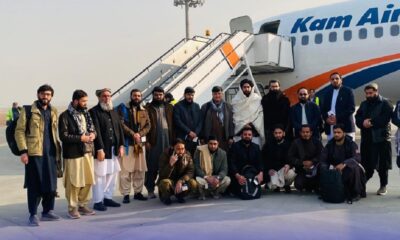
 Latest News4 days ago
Latest News4 days agoAfghanistan’s mines ministry sends technical team to Uzbekistan for training

![DRUG 9-12-2015-DARI SOT.mpg_snapshot_00.47_[2015.12.09_18.16.30]](https://ariananews.af/wp-content/uploads/2015/12/DRUG-9-12-2015-DARI-SOT.mpg_snapshot_00.47_2015.12.09_18.16.30-300x240.jpg)













